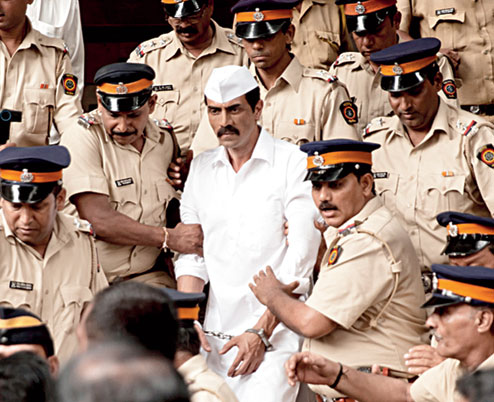
The word “daring”—- a popular Mumbaiyya parlance for the gutsy — is used a lot in Daddy. But Daddy, in itself, is not quite daring. Dawood Ibrahim, India’s most-wanted man, is a central character in this film, complete with unmistakable retro glasses and trademark moustache. But he’s passed off as a don called Maqsood, even as the rest of this Arun Gawli biopic is built around players and situations that are based on real life. And yes, Dawood aka Maqsood is played by Farhan Akhtar, in what is probably the most bizarre piece of miscasting in recent times.
Thankfully, the rest of Daddy gets it more right than wrong, including an earnest Arjun Rampal who not only slips on a prosthetic nose and a steely stare to play the criminal-turned-politician, but also lends a hand in penning the story and screenplay, partnering with director Ashim Ahluwalia. Ahluwalia, who made us sit up and take notice with his hard-hitting look at the C-grade film industry in Miss Lovely, starring Nawazuddin Siddiqui, a few years ago, plunges headlong into telling the tale of Gawli, his rise from an out-of-work mill worker to a hardened criminal to a man looking for redemption as social worker and politician playing out through a series of flashbacks and fast-forwards.
Daddy — named after the Moniker Gawli earned from his supporters at Dagdi Chawl, a Mumbai suburb — operates through a non-linear narrative, constantly shifting between the ’80s and ’90s to 2012, when Gawli was put away in prison for life on a murder charge. But while the technique is novel, the execution is jarring, making the film a confusing watch.
Daddy predominantly operates in the ’80s with Gawli, born into humble beginnings, steadily taking to a life of crime when he loses his job at a mill, a phenomenon that’s said to have given birth to millions of Arun Gawlis and spawned the Mumbai underworld. Starting off with “hafta, matka aur chori”, Gawli and his comrades — Babu (Anand Ingale) and Rama (Rajesh Shringarpure) — quickly transition to smuggling and finally murder, forming a gang, creatively named BRA (after Babu-Rama-Arun). While BRA works within the grimy bylanes of Dagdi, its operatives dream far bigger, including being able to partner one day with Mumbai’s (then Bombay) big man of crime, Maqsood.

A brush with the law brings Gawli and his men close to Maqsood — he’s caught by the cops, Maqsood arranges bail with a snap of the fingers — and the two start working together. However, Gawli, realising that Maqsood and his men are double-crossing him and bumping off most of his gang members, wants to break free and that sets up a bitter rivalry between the two.
However, what could have been a juicy face-off tapers off quickly, with Maqsood exiting the scene in 1993 — tough not to fathom why, even though the film doesn’t spell it out — and the rest of Daddy focuses on Gawli gradually shunning a life of crime to become a messiah of sorts, his metamorphosis contributing to the film’s tagline: ‘The only one who did not run’. His new nemesis arrives in the form of cop Vijaykar Nitin (Nishikant Kamat), who is painted more corrupt than upright, looking for every available opportunity to “encounter off” Gawli.
Like Miss Lovely, Ahluwalia gets the milieu right, his sketch of the ’80s not just limited to high collars and bell bottoms, but also an authentic portrayal of the powerplay and the nexus that existed between the underworld, corporates and politicians of the time to milk the booming Bombay real estate dry through a series of dubious deals and deadly murders. The film’s play of light and shade (cinematographers Jessica Lee Gagne and Pankaj Kumar do a stellar job) gives it a real and grubby look and feel.
But a big problem with Daddy is how it eulogises a criminal. “Uski sabse badi galti uski gareebi thi,” says someone at the beginning of the film and the rest of Daddy focuses on polishing the halo around Gawli’s head, painting him as a modern-day Robin Hood, that Gawli’s daughter — well versed in English unlike him — translates as “chor hai par villain nahin”. Also, the film plateaus off quickly, the frenetic build-up of the first hour giving way to a languid Half Two.
Barring Farhan, the film scores for its casting, with Aishwarya Rajesh, playing Gawli’s wife Zubeida, bringing in a luminous presence and Kamat — the man who’s directed films like Force and Drishyam — excelling in his portrayal of a grey character. Daddy is a film for Rampal to show (and also prove) his acting chops and the man does well, giving us a flesh-and-blood character that makes us see beyond his body beautiful. The prosthetic nose, however, gets some getting used to, okay in some parts, uneven in others.
Just like Daddy.
Priyanka Roy











